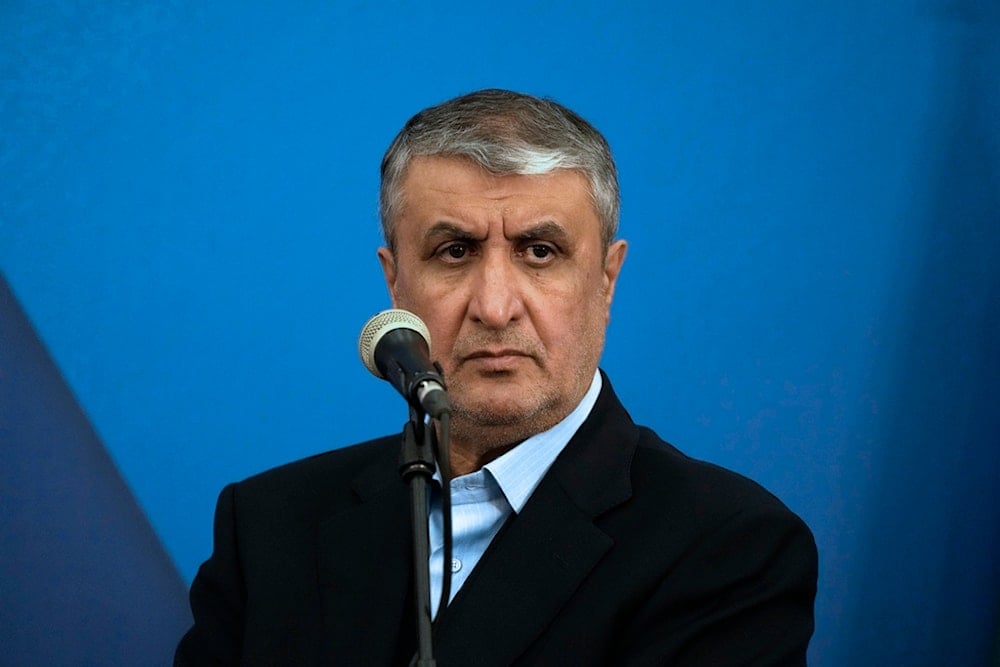AEOI rejects IAEA report, reaffirms enrichment as Iran's 'red line'
The Head of the Atomic Energy Organization of Iran dismisses the IAEA’s claims on Tehran's nuclear program and reveals sabotage at an Iranian nuclear facility.
-

Head of Atomic Energy Organization of Iran Mohammad Eslami listens during his joint press conference with International Atomic Energy Agency (IAEA) Director General Rafael Mariano Grossi in Tehran, Iran, Thursday, November 14, 2024. (AP)
The Head of the Atomic Energy Organization of Iran (AEOI), Mohammad Eslami, has firmly rejected the latest report issued by the International Atomic Energy Agency (IAEA), asserting that Iran is in full compliance with the Safeguards Agreement and the Non-Proliferation Treaty (NPT).
This comes amid growing tensions between Iran and Western powers over its nuclear activities. A confidential IAEA report released on Saturday claimed that Iran had carried out undeclared nuclear work at three sites; Lavisan-Shian, Varamin, and Turquzabad, tied to a clandestine program active until the early 2000s.
The IAEA also reported a sharp increase in Iran’s stockpile of uranium enriched to 60%, which now stands at 408.6 kilograms, a level nearing the threshold for weaponization if enriched further.
Tehran has repeatedly affirmed that nuclear weapons have no place in its defense doctrine, citing a religious decree by the Leader of the Islamic Revolution and the Islamic Republic of Iran, Sayyed Ali Khamenei, as the moral and strategic foundation for its peaceful nuclear stance.
Read more: Iran warns against politicization of IAEA during critical period
Enrichment is Iran’s 'red line', says Eslami
Speaking to national television on Sunday, Eslami underscored that uranium enrichment remains a fundamental and non-negotiable element of Iran’s nuclear strategy.
“This issue is known as the red line for the Islamic Republic of Iran. There is no alternative to enrichment,” he stressed.
The Iranian official explained that the fuel cycle cannot exist without enrichment, and without it, critical research and applications in medicine, industry, and energy would be compromised.
“We cannot deprive ourselves of our domestic wealth and facilities,” he said.
Read more: Iran warns E3 against politicizing IAEA report: Exclusive
AEOI chief says Iran pursues peaceful nuclear cooperation
Highlighting Iran’s continued willingness to engage internationally, Eslami pointed to the Bushehr nuclear power plant as a successful example of cooperation with foreign companies.
He noted that additional projects are being explored with international partners in the peaceful nuclear field.
Eslami accuses IAEA chief Grossi of political ambitions
In a pointed critique, Eslami accused IAEA Director General Rafael Grossi of using his position to further personal political ambitions.
“Grossi, due to his ambitions and desire to become UN Secretary-General, is seeking to gain the votes of a few specific countries and promote himself,” Eslami said.
Sabotage discovered at Iranian nuclear facility
The AEOI chief also revealed that one of Iran’s security agencies had uncovered an act of sabotage at a nuclear site, adding that the incident was promptly reported to the IAEA’s Deputy Director General.
Iran rejects IAEA report, says it is based on forged Israeli documents
The Iranian Foreign Ministry and the AEOI have strongly condemned the latest report issued by the IAEA, describing it as a politically motivated document that disregards Iran’s cooperation and reflects continued Western violations of the 2015 nuclear agreement.
Tehran stated that the report is based on forged Israeli documents, arguing that such reliance violates the IAEA’s principles regarding source credibility.
Iran stressed that "Israel", a third party not part of the NPT, continues to threaten Iran’s peaceful nuclear program while remaining outside the international regulatory framework, although it possesses a nuclear arsenal.
The statement expressed regret that the IAEA had not condemned repeated Israeli threats, despite repeated requests from Tehran.

 4 Min Read
4 Min Read








